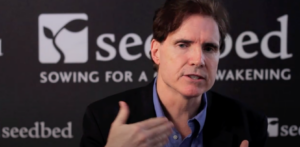We’ve been on social media a long time now. We’ve watched it go through that “terrible twos” stage when people thought it reasonable to post personal disagreements with family members (thank goodness we’ve gotten past that). We watched the exodus from Facebook of the generation who made it famous, when their parents all jumped in. We weathered the election and discovered that not every opinion is for public consumption (some convictions are meant to be held, not yelled).
As a pastor, I value social media. I have a much better understanding by perusing their posts of how my own people live from day to day. I wish I’d had the benefit of social media when I was starting a church; I believe it would have made a significant difference.
Done well, social media builds relationships but here’s the thing: when the expectations get out of whack — when people use social media to send all their spoken and unspoken messages without ever having a real conversation, or when they assume too much of the reader — building online relationships can be confusing for a pastor.
It sometimes feels like we’re expected to read minds while ignoring dysfunction. Good pastors aren’t good at either.
Here are a few things I’ve discovered through my own experience that might help if your pastor is your friend online and you’d like to make the most of that relationship.
1. Don’t expect us to know what you’ve posted about your recent surgery or family loss. That might have worked when we all had one hundred friends, but now that we’ve all amassed far more people on our pages than we actually know, Facebook doesn’t automatically match up your pastoral need with your pastor. Further, you don’t really want your pastor to spend all his time online, trolling for how things are going with you. If you want us to know, call.
2. The more you want us to see your post, the less likely we are to see it. Likewise, the less you want us to see your post, the more likely we are to see it. It is Murphy’s Law. Yes, we see your unkind comments and we love you any way (we’d appreciate it if you’d return the favor). No, we didn’t see that you lost a leg in a car accident (what makes you think we’d ignore something like that?). If you want us to know, call. If you don’t want us to know, you probably shouldn’t be posting it anyway.
3. Don’t unfriend us when you go to another church. That’s just mean. Seriously. We didn’t leave you. We didn’t reject you. And in fact, we probably still love and miss you. When you unfriend us just so we won’t see how awesome a time you’re having at another church, well … that just adds insult to injury. If you were hoping we’d still be your friend if we change jobs, then please return the favor. Treat us as adults. Call and talk to us about your decision to move, then foster a friendly, mature relationship and spare us both the awkwardness and injury.
4. Likewise, please don’t post how much better we are than the pastor you just left. We probably like that pastor (heck, we probably just had breakfast with him). Sheep-trading isn’t something we enjoy; don’t make it harder than it has to be. If you want us to know we’re awesome, pick up the phone and call. We’d love to have that conversation with you.
5. Do your church a favor. Please don’t post how much you love your church right after you’ve posted something no pastor would be proud to own. It is like having road rage with a fish on your car. No one is helped by that. Pastors are passionate about seeing people grow spiritually as followers of Jesus. Your posts are one way we know how we’re doing. When you cuss, rant, or talk publicly about your mother-in-law, it is understandably discouraging. When you link those behaviors to your whole church … well, that’s just frustrating.
6. If it is important, CALL. There is still no substitute for a personal phone call. Don’t tell us about a death in your family by facebook message or text. If you want us to know, call. If you don’t want us to know, please don’t be offended when we don’t show up when you need us. We’d be there, but we don’t read minds.
7. Live your faith well, then live it online. That is the best encouragement any person can give to their pastor — the recognition that all those sermons, all those small group meetings, all those counseling sessions, all those prayers are making a difference. Seeing you live a vibrant, healthy, personal relationship with Jesus both publicly and privately is a huge blessing to those who lead you spiritually. I can promise you that for a pastor, there is no greater gift.








